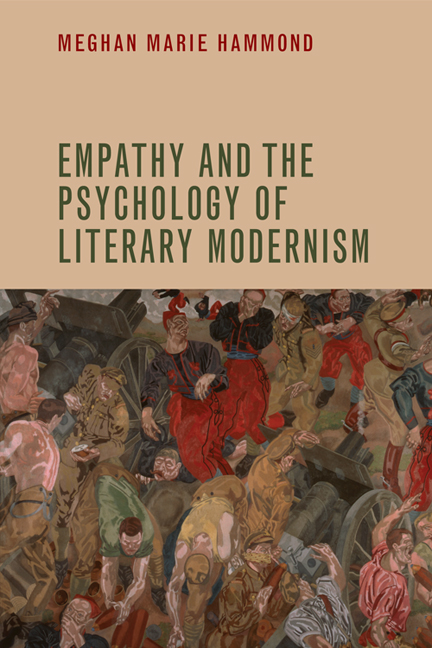Book contents
- Frontmatter
- Contents
- Acknowledgements
- Abbreviations
- Introduction: The Problem of Other Minds and the Fin de Siècle World
- 1 Into Other Minds: William and Henry James
- 2 Dorothy Richardson's Modernist Innovation
- 3 Communities of Feeling in Katherine Mansfield's Fiction
- 4 Empathy and Violence in the Works of Ford Madox Ford
- 5 Virginia Woolf and the Limits of Empathy
- Coda: New Structures of Fellow Feeling
- Bibliography
- Index
Coda: New Structures of Fellow Feeling
Published online by Cambridge University Press: 05 August 2016
- Frontmatter
- Contents
- Acknowledgements
- Abbreviations
- Introduction: The Problem of Other Minds and the Fin de Siècle World
- 1 Into Other Minds: William and Henry James
- 2 Dorothy Richardson's Modernist Innovation
- 3 Communities of Feeling in Katherine Mansfield's Fiction
- 4 Empathy and Violence in the Works of Ford Madox Ford
- 5 Virginia Woolf and the Limits of Empathy
- Coda: New Structures of Fellow Feeling
- Bibliography
- Index
Summary
Woolf's Between the Acts ends on a haunting note. Isa and Giles, who have spent the day as an unhappy, distant couple, find themselves alone when evening comes, sitting silently together in the family library:
Before they slept, they must fight; after they had fought, they would embrace. From that embrace another life might be born. But first they must fight, as the dog fox fights with the vixen, in the heart of darkness, in the fields of night […] The house had lost its shelter. It was night before roads were made, or houses. It was the night that dwellers in caves had watched from some high place among the rocks. Then the curtain rose. They spoke. (BA 129–30)
Here, the pulse of history that throbbed throughout Miss La Trobe's play reaches back to both the prehistoric origin of communal human life and the beginnings of modernist literature, referencing Joseph Conrad's 1899 novel Heart of Darkness. With their nation and community on the precipice of a new break in history, the coming war, Isa and Giles rejoin each other. Whether or not their fighting and embracing will produce fellow feeling, we do not know. Whatever words they share are beyond us. The curtain rises and Isa and Giles speak, but we are not witnesses to what comes next. This final performance in Between the Acts has no audience: there is ‘nobody there to describe them’ and ‘life does not narrate’ them. Ultimately, in Between the Acts, Woolf is asking us to give up any comforting illusion that we can feel our way into characters without a heavy representational apparatus.
Throughout this book, my goal has been to map the presence of empathic structures and concerns in literary modernism. My work here could only ever be a beginning, for the constellation of literary, psychological, historical and cultural developments in which we find modernist empathy is, to say the least, a complicated one. I hope that by drawing out the connections between Henry James, Richardson, Mansfield, Ford and Woolf on one side, and William James, Titchener, Vischer, Lipps, Scheler, Lee, Hulme, Stein and Husserl on the other, I have been able to illuminate some bright spots in that constellation.
- Type
- Chapter
- Information
- Empathy and the Psychology of Literary Modernism , pp. 176 - 179Publisher: Edinburgh University PressPrint publication year: 2014



